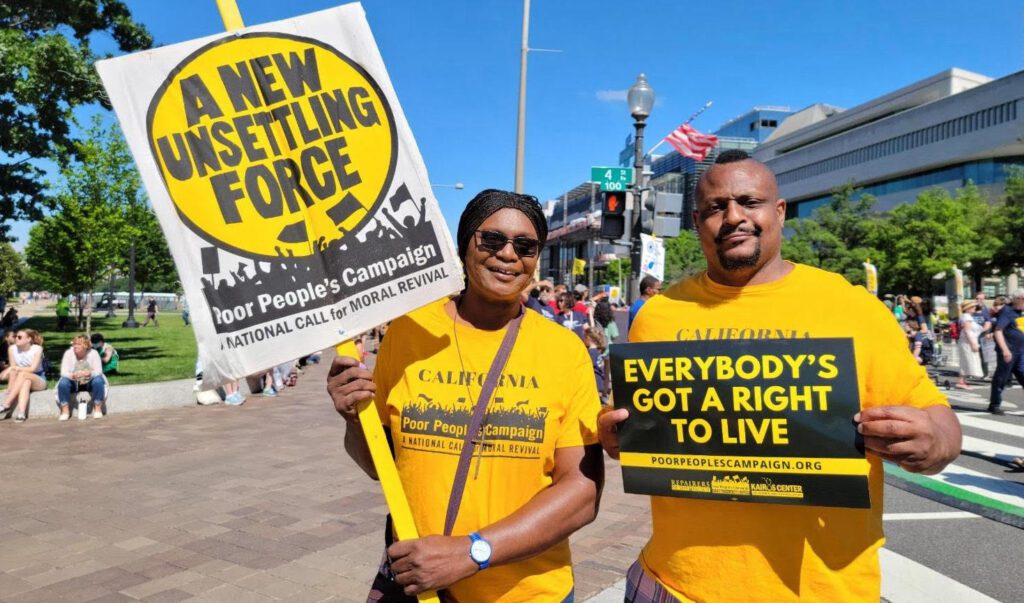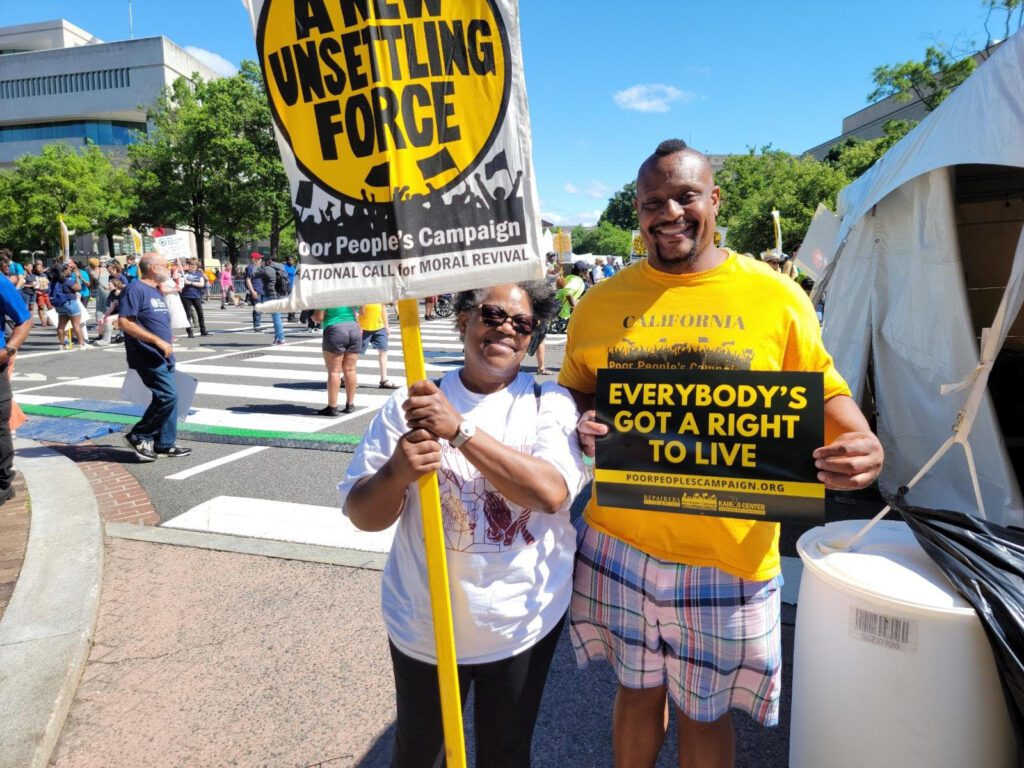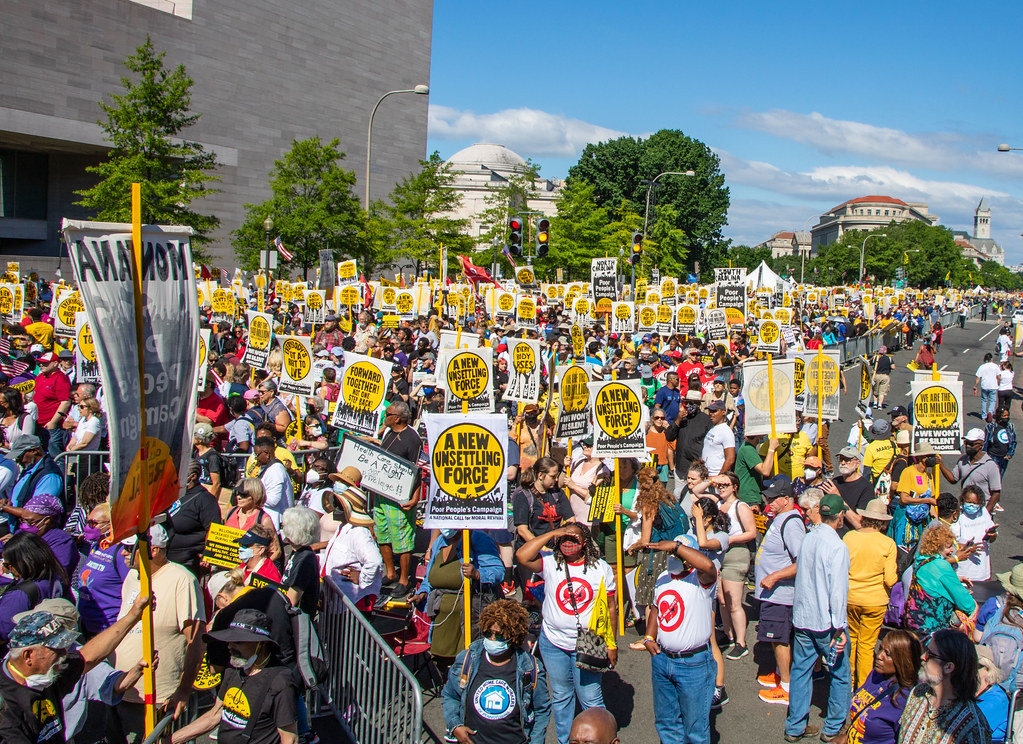
On June 18, 2022, in front of the Nation’s Capital, LaDonna Harris, Jeremiah Jenkins and I attended the Mass Poor People’s Assembly and Moral March on Washington, DC. It was a powerful gathering of poor and low wealth people, state leaders, faith communities, moral allies, and partnering organizations. The event was a declaration of commitment to 1) build power, 2) shift the political narrative and 3) make real policies to fully address poverty and low wealth from the bottom up.
The assembly, which was attended by thousands, was a demand for a nation to give attention to the personal and collective struggles of poor people and low wage workers from all 50 states. LaDonna commented, ““It was good that more space was made for the voices of impacted people. That said, it is equally important that our legislative leaders also be present to hear these voices and these stories. I imagine John Lewis and Isaiah Cummins would have been here. Where are our leaders?” Jeremiah commented, “Usually, an event like this would have many public figures on stage. Instead of primarily hearing from public figures, we heard from poor people from most of the states in the Union. Hearing these stories served as a reminder that there are poor people in every corner of this country. Poverty is not held at bay by race, religion, or region. The coalition against poverty should include all kinds of folk because it absolutely ravishes all kinds of folk.”

The testimonies were powerful and impactful, revealing the values that ground the work of the movement and gave clarity to the work that needs to be done to address struggles of 140 million poor and low wealth people, including 52% of children and a nations’ moral footing.
As important as the concerns around poverty and low wealth are, there was little if any national coverage. Jeremiah commented, “Unfortunately, if there had been Senators and celebrities speaking at this event there would have likely been much more media coverage. A sad reminder that this country struggles to care about the problems of those in the lowest economic bracket. The latest mass shooting, for example, will have ample media coverage. We will hang on for each update in part because we fear that the next horrific event might harm us or someone we love. We will be heartbroken and outraged as we should. Unfortunately, little compassion may be left for the 45,000 people (about twice the seating capacity of Madison Square Garden) who die from poverty in this country annually. But we do not have to treat compassion as if it is a scarce commodity. We do not have to choose which group deserves our concern. I just marched with thousands of people who understand this, and I believe that there are millions upon millions more. Imagine what we can carry out together.”
The speakers at the Mass Poor People’s and Low-Wage Workers Assembly March on Washington brought forward many concerns we share in our region. To address these concerns, it is important to look at the following:

1) Voices. What are those ministry programs that lift the voices of impacted people such as the Christian Church of Northern California Nevada Housing Ministry. Ministry programs that could be implemented might be healthcare, poverty and environmental justice. The voices of impacted people can also be lifted through scripture. The book, “We Cry Justice: Reading the Bible with the Poor People’s Campaign”, you can find on Amazon, written by Rev. Dr. William Barber and Rev. Dr. Liz Theoharis, interpret sacred stories about the poor seeking healing, equity, and freedom. In a world roiled by poverty and injustice, Scripture still speaks.
2) Values. In a society where poverty and low wealth have little value politically it is necessary to shift the moral narrative to make a more just society where people who are low wealth and poverty are valued. This is what Rev. Dr. William Barber calls a “Revolution of Values.” Shifting the moral narrative requires (1) hearing the stories of impacted people (2) doing research that includes The Souls of Poor Folk, an analysis provided by the Institute for Policy Studies, and most importantly, (3) Partnering with impacted people, their community and organizations which may require moving beyond one’s comfort zone.
3) Visibility. Hearing and listening to the voices of poor and low wealth people and shifting the moral narrative around values is a calling of advocacy. Advocacy may involve joining a group to help supply food, clothing, housing, and health care for those in need. It may involve attending meetings at citadels of power where the Church can advocate for the interest of poor, marginalized and low wealth people and the environment.
The Mass Poor People’s and Low-Wage Workers Assembly March on Washington was a phenomenal event that brought together people from all 50 states who work for a more just society. It lifted compelling stories that looked to shift the moral narrative around poverty and low wealth. Most importantly the assembly brought the issues and concerns of 140 million poor and low wealth people to the nations seat of political power.
We will not be silent!
Forward Together not One Step Back
Rev. Dr. Monica Joy Cross is the Minister of Women's Ministries and Education in the Christian Church of Northern California Nevada Region, and member of the Laney Teach-in/Poor People's Campaign. See links to more articles by Rev. Dr. Monica Joy Cross at:
http://peoplestribune.org/pt-news/2018/10/oakland-ca-standing-against-housing-crisis-homelessness/

Great article, great event Dr. Cross!